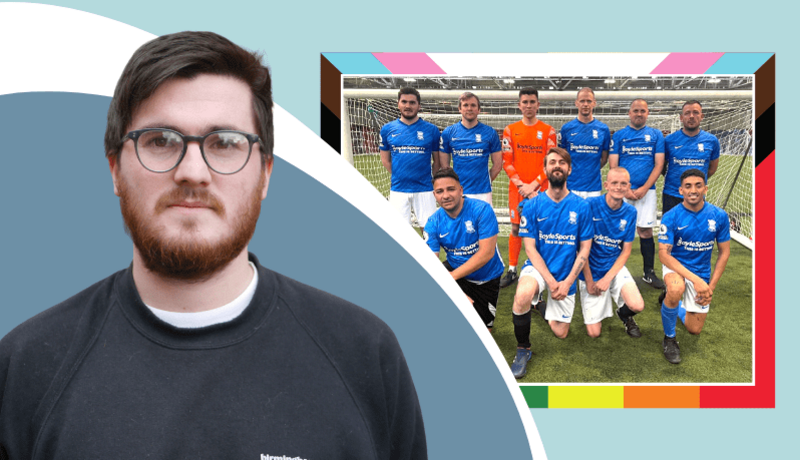Personal Perspective | LGBT+ History Month with Tom McClay
Posted on February 2023

LGBT+ History Month celebrates the achievements of LGBT+ people and advances education about the issues affecting their community. As part of our celebrations, we heard from Tom McClay, Executive Consultant on our Midlands Construction team, about his influential queer figures and the life-changing impact of joining an LGBT+ friendly football team.
When I started university, the word ‘bisexual’ wasn’t in my vocabulary; I didn’t understand it or know that it related to me, but from my teens, whenever I had conversations about people I found attractive, I was never selective about their gender. It wasn’t until four and a half years ago that I started knowing what bisexual meant to me, and the power of that label to give me confidence to meet other LGBTQ people and know that I was a part of this wider group.
Queer pop stars and politicians have been shaping culture, politics, technology, international relationships – and other areas of life – forever, and that should be celebrated. LGBT+ History Month can be helpful to celebrate and educate about this; even by calling it history, it corrects some people’s ideas that queer people and their influence are new. There were a lot of headlines recently about Kim Petras being the first transgender person to win a Grammy, but Wendy Carlos was an electronic music pioneer who won three Grammys back in 1970, when she was transitioning into a woman.
“Even by calling it history, it corrects some people’s ideas that queer people and their influence are new.”
Wendy had to glue on sideburns and wear fake stubble for interviews because everyone thought that she was still the man that she was living as before. But beyond that she was tinkering on in the background, having a very successful music and technology career.
Another significant LGBTQ person is Beth Mead, I was in London watching her win Euro 22 with the Lionesses, she is an inspiration for her footballing achievements on their own merit: she hasn’t said, ‘I’m a queer footballer, pick me to hit your quota,’ she said, ‘I’m the best footballer, I’m going to win trophies.’ This is an exceptional athlete who happens to have an extra thing: she’s a lesbian.
I watched football on the TV from when I was four. When I was at school I played on Saturdays and I also coached my brother’s football team for two years, but when I went to university I wasn’t good enough to get into the team and gave up on playing. Sometime later I tried to get into other football teams for fitness and friends, but these places often make it hard for queer people to get by. There are homophobic ideas that are celebrated rather than put down; one idea is that if you’re gay you’ll be a rubbish footballer, the chant went, ‘Does your boyfriend know you’re here?’ These make me not want to be in those places, especially if I’m going for friendship and I already feel like an outsider.
“[Joining Birmingham Blaze] helped me to come out of my shell and was another turning point where I started celebrating my bisexuality and seeking out friends who were from the LGBTQ community.”
But when I started playing for Birmingham Blaze, an LGBTQ-friendly Sunday League team, I found that a lot of them were queer and would go to gay bars after games; I realised I wasn’t going to experience the homophobia that made me cringe and retreat into myself. It helped me to come out of my shell and was another turning point where I started celebrating my bisexuality and seeking out friends who were from the LGBTQ community. It’s not that I’m only going to those people to talk about my sexuality –the conversations are mainly about football and what we did at the weekend! – but I know they’re available to support me and celebrate together.
You don’t need to be LGBT+ to play for them, but the people who join have decided that the best competitive Sunday League football that they can get in Birmingham is for this openly gay team. In the same way that Beth Mead stands on the merit of her achievements, we’re an exceptional football team, and by the way it’s run by a gay manager, a gay captain, a gay treasurer, and two gay chairmen.
I joined the committee last year, and it’s my role to welcome new members and try to get them to come back again and again. Through that I’ve seen in others the early stages of exactly what I had: people making more friends, getting fitter and better at football, and becoming more confident in themselves. I hope they take that into the rest of their lives as I have done.
I can’t go back and transport my maturity into my younger self, but I know that when I was a teenager I recognized other queer people and didn’t build them up, which didn’t help them and it didn’t help me. So if I had a message to tell my younger self it would be: believe that your people are out there and find them, it’s well worth your time.
Recent Articles
-
Revalidating our Silver Award and strengthening our commitment to the Armed Forces Covenant
We are proud to announce that we have successfully revalidated our Silver Award under the Defenc...
8 days ago -
Understanding Islam
For Islamophobia Awareness Month, we are privileged to have passionate employees who wanted to s...
about 2 months ago -
Practical ways to stay calm and confident in interviews
Landing an interview is an important career milestone, but it’s natural to feel nervous even expe...
about 2 months ago